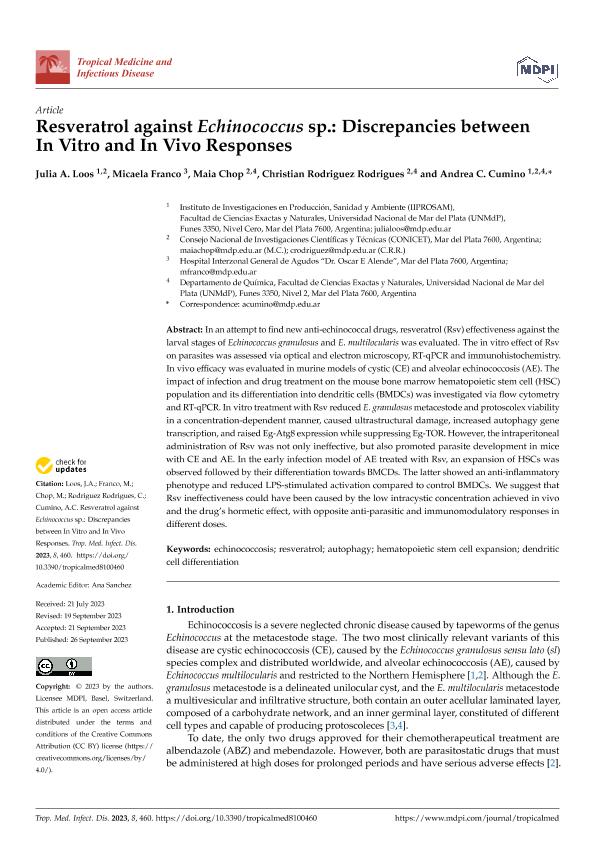Artículo
Resveratrol against Echinococcus sp.: Discrepancies between In Vitro and In Vivo Responses
Loos, Julia Alexandra ; Franco, Micaela; Chop, Maia
; Franco, Micaela; Chop, Maia ; Rodríguez Rodrígues, Christian Fernando Ariel
; Rodríguez Rodrígues, Christian Fernando Ariel ; Cumino, Andrea Carina
; Cumino, Andrea Carina
 ; Franco, Micaela; Chop, Maia
; Franco, Micaela; Chop, Maia ; Rodríguez Rodrígues, Christian Fernando Ariel
; Rodríguez Rodrígues, Christian Fernando Ariel ; Cumino, Andrea Carina
; Cumino, Andrea Carina
Fecha de publicación:
09/2023
Editorial:
MDPI
Revista:
Tropical Medicine and Infectious Disease
e-ISSN:
2414-6366
Idioma:
Inglés
Tipo de recurso:
Artículo publicado
Clasificación temática:
Resumen
In an attempt to find new anti-echinococcal drugs, resveratrol (Rsv) effectiveness against the larval stages of Echinococcus granulosus and E. multilocularis was evaluated. The in vitro effect of Rsv on parasites was assessed via optical and electron microscopy, RT-qPCR and immunohistochemistry. In vivo efficacy was evaluated in murine models of cystic (CE) and alveolar echinococcosis (AE). The impact of infection and drug treatment on the mouse bone marrow hematopoietic stem cell (HSC) population and its differentiation into dendritic cells (BMDCs) was investigated via flow cytometry and RT-qPCR. In vitro treatment with Rsv reduced E. granulosus metacestode and protoscolex viability in a concentration-dependent manner, caused ultrastructural damage, increased autophagy gene transcription, and raised Eg-Atg8 expression while suppressing Eg-TOR. However, the intraperitoneal administration of Rsv was not only ineffective, but also promoted parasite development in mice with CE and AE. In the early infection model of AE treated with Rsv, an expansion of HSCs was observed followed by their differentiation towards BMCDs. The latter showed an anti-inflammatory phenotype and reduced LPS-stimulated activation compared to control BMDCs. We suggest that Rsv ineffectiveness could have been caused by the low intracystic concentration achieved in vivo and the drug’s hormetic effect, with opposite anti-parasitic and immunomodulatory responses in different doses.
Palabras clave:
Echinococcus granulosus
,
resveratrol
,
BMDCs
,
anti-parasitic response
Archivos asociados
Licencia
Identificadores
Colecciones
Articulos (IIPROSAM)
Articulos de INSTITUTO DE INVESTIGACIONES EN PRODUCCION, SANIDAD Y AMBIENTE
Articulos de INSTITUTO DE INVESTIGACIONES EN PRODUCCION, SANIDAD Y AMBIENTE
Articulos(CCT - MAR DEL PLATA)
Articulos de CTRO.CIENTIFICO TECNOL.CONICET - MAR DEL PLATA
Articulos de CTRO.CIENTIFICO TECNOL.CONICET - MAR DEL PLATA
Citación
Loos, Julia Alexandra; Franco, Micaela; Chop, Maia; Rodríguez Rodrígues, Christian Fernando Ariel; Cumino, Andrea Carina; Resveratrol against Echinococcus sp.: Discrepancies between In Vitro and In Vivo Responses; MDPI; Tropical Medicine and Infectious Disease; 8; 10; 9-2023; 1-18
Compartir
Altmétricas



